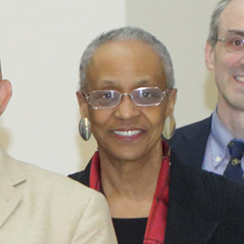Related Research Articles
The Master of Public Health(MPH), Master of Science in Public Health (MSPH), Master of Medical Science in Public Health (MMSPH) and the Doctor of Public Health (DrPH), International Masters for Health Leadership (IMHL) are interdisciplinary professional degrees awarded for studies in areas related to public health. The MPH degree focuses on public health practice, as opposed to research or teaching. Master of Public Health programs are available throughout the world in Schools of Public Health, Programs in Public Health, Medical Schools, and Schools of Public Affairs. MPH degrees, in addition to including a core curriculum, will usually also let students pursue a specialization in a specific field, such as epidemiology, biostatistics, or health management.

The Yale School of Public Health (YSPH) was founded in 1915 by Charles-Edward Amory Winslow and is one of the oldest public health masters programs in the United States. It is consistently rated among the best schools of public health in the country, receiving recent rankings of 3rd for its doctoral program in epidemiology. YSPH is both a department within the school of medicine as well as an independent, CEPH-certified school of public health.

The UCLA Jonathan and Karin Fielding School of Public Health is the graduate school of public health at UCLA, and is located within the Center for Health Sciences building on UCLA's campus in the Westwood neighborhood of Los Angeles, California. The UCLA Fielding School of Public Health has 690 students representing 25 countries, more than 11,000 alumni and 247 faculty, 70 of whom are full-time.

The Tulane School of Public Health and Tropical Medicine is part of Tulane University, located in New Orleans, in the U.S. state of Louisiana.
Graham Andrew Colditz MD, DrPH is an Australian chronic disease epidemiologist. He is the inaugural Niess-Gain Professor at Washington University School of Medicine, where he is associate director for Prevention and Control at the Alvin J. Siteman Cancer Center. He directs the Master of Population Health Science at Washington University School of Medicine. During medical training he was excited by the potential for prevention of chronic diseases. With encouragement from mentors he pursued training in the US as it was routine for academics in Australia to obtain overseas training at that time. He is internationally recognized for leadership in cancer prevention, and is often interviewed by media for input on this topic. With members of Cancer Prevention and Control at Siteman, he blogs on issues relating to cancer prevention and screening. According to Google Scholar statistics, Colditz has a h-index of more than 300.

The Drexel University Dornsife School of Public Health is a part of the Drexel University Health Sciences network of schools. The Dornsife School of Public Health was located in downtown Philadelphia from its inception until December 2013. It has since re-located to the University City Campus.

Sandro Galea is a physician, epidemiologist, and author. He is the Robert A. Knox professor and dean at the Boston University School of Public Health. He is the former Chair of Epidemiology at the Columbia University Mailman School of Public Health. Dr. Galea is past president of the Society for Epidemiologic Research and an elected member of the American Epidemiological Society. He was elected to the National Academy of Medicine in 2012, chairing two of the organization's reports on mental health in the military. He formerly served as chair of the New York City Department of Health and Mental Hygiene's Community Services Board and as a member of its Health Board.
James W. Curran is professor of epidemiology and dean of the Rollins School of Public Health at Emory University. He is an adjunct Professor of Medicine and Nursing, and Co-Director and Principal Investigator of the Emory Center for AIDS Research. He is immediate past chair of the board on Population Health and Public Health Practice of the Institute of Medicine and served on the Executive Committee of the Association of Schools of Public Health. Additionally, he holds an endowed chair known as the James W. Curran Dean of Public Health. Curran is considered to be a pioneer, leader, and expert in the field of HIV/AIDS.

Michael B. Bracken is an American perinatal epidemiologist. He is the Susan Dwight Bliss Professor of Epidemiology at the Yale School of Public Health, and Professor of Obstetrics, Gynecology and Reproductive Sciences, and Professor of Neurology at the Yale School of Medicine. He is co-director of the Yale Center for Perinatal, Pediatric and Environmental Epidemiology.
Abraham Morris Lilienfeld was an American epidemiologist and professor at the Johns Hopkins School of Hygiene and Public Health. He is known for his work in expanding epidemiology to focus on chronic diseases as well as infectious ones.
Leon Gordis was an American epidemiologist, professor and author, whose textbook Epidemiology provided a foundation for the understanding of epidemiologic principles and clinical applications.
Kenneth J. Rothman is an American epidemiologist. He is a professor of epidemiology at the Boston University School of Public Health, as well as a Distinguished Fellow at RTI International, where he is Vice President for Epidemiologic Research at RTI Health Solutions.
The Harvard Center for Population and Development Studies (HCPDS) is an interfaculty initiative at Harvard University that is closely affiliated with the Harvard T.H. Chan School of Public Health.
The Society for Epidemiologic Research is a learned society dedicated to epidemiology. It was originally proposed in 1967 by Abraham Lilienfeld, Milton Terris, and Brian MacMahon, and was founded the following year. Their motivation in founding SER was to provide an annual meeting where junior faculty in epidemiology departments and graduate students could present their ongoing research to senior epidemiologists and receive criticism, comments, and encouragement. An additional goal was to promote the exchange of ideas between epidemiologists and statisticians.

Shiriki K. Kumanyika is an Emeritus Professor of Biostatistics and Epidemiology at the Perelman School of Medicine at the University of Pennsylvania and co-chair of the International Association for the Study of Obesity International Obesity Task Force. She has previously served as Associate Dean for Disease Prevention and was founding director of the University of Pennsylvania Master of Public Health. She chairs the African American Collaborative Obesity Research Network. She is the former president of the American Public Health Association.

Louise Annette Brinton is an American epidemiologist. She was a senior investigator, Chief of the Hormonal and Reproductive Epidemiology Branch, and the first Scientific Advisor for International Activities of the National Cancer Institute Division of Cancer Epidemiology and Genetics.
Renee M. Johnson is an American scientist specializing in the mental health of adolescents and young adults. She researches substance abuse, substance use epidemiology, and violence in marginalized youth including persons of color, LGBTQ, and immigrants. Johnson is an associate professor in the Johns Hopkins Bloomberg School of Public Health.
Gina Danielle Schellenbaum Lovasi is the Interim Dean of the Dornsife School of Public Health at Drexel University. She has authored more than 140 peer-reviewed articles and co-edited the book Urban Public Health: A Research Toolkit for Practice and Impact.
April Perry Carson is an American epidemiologist. She is an associate professor of epidemiology and associate dean for diversity, equity, and inclusion at the University of Alabama at Birmingham School of Public Health. Carson is director of the Jackson Heart Study.
Qing Lan is a Chinese physician-scientist and molecular epidemiologist who researches indoor air pollution, lung cancer, and occupational exposures. She is a senior investigator in the occupational and environmental epidemiology branch at the National Cancer Institute.
References
- ↑ "At the Helm of the School of Public Health: Q&A with Ana Diez Roux". DrexelNow. 3 November 2014. Retrieved 16 April 2020.
- ↑ "MacArthur SES & Health Network | About the Network". macses.ucsf.edu. Retrieved 16 April 2020.
- ↑ "Ana Diez Roux, MD, PhD, MPH". Dornsife School of Public Health. Retrieved 2020-06-18.
- ↑ "Ana V. Diez Roux, MD, PhD, MPH". The Guide to Community Preventive Services (The Community Guide). 2017-01-20. Retrieved 2020-06-18.
- ↑ "The Society for Epidemiologic Research Presents Dean Diez Roux with Kenneth Rothman Career Accomplishment Award". Drexel University Dornsife School of Public Health. 2021-06-28. Retrieved 2022-03-10.